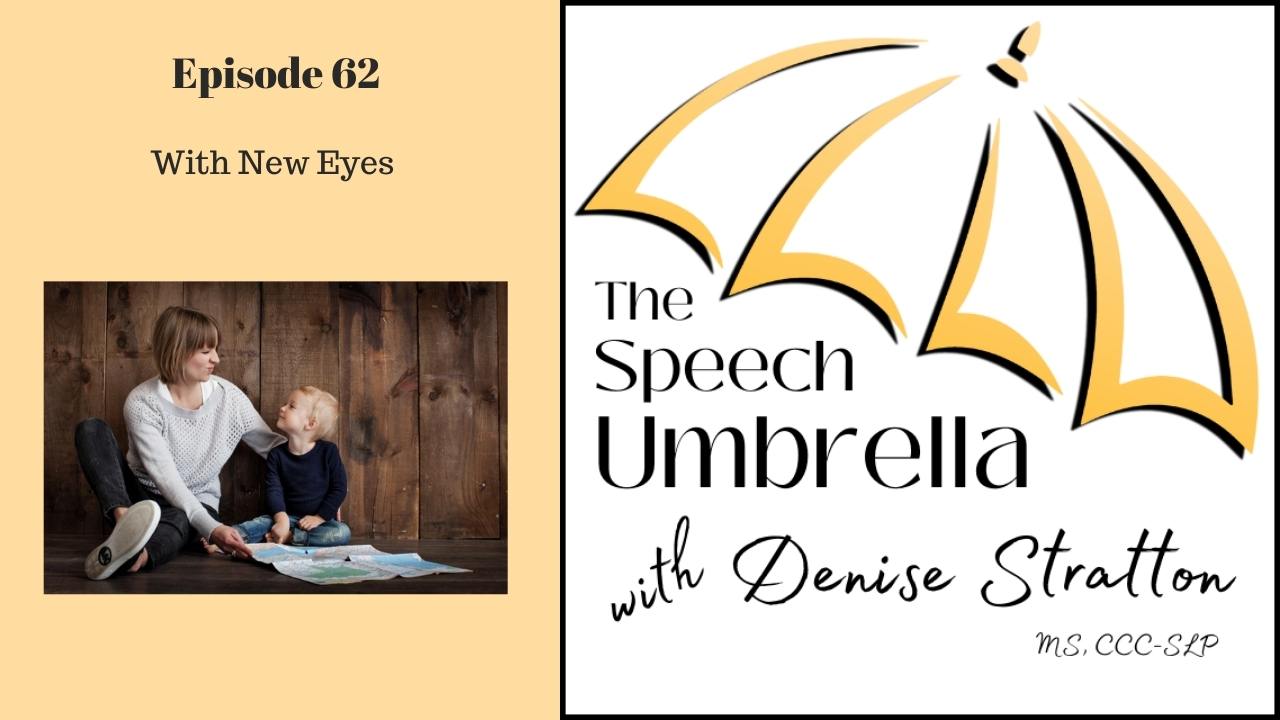
As SLPs, problem solving is something we do every day with our clients. But add behavior challenges into the mix and progress can come to a screeching halt. Many of us don’t receive training in this area, even at the graduate school level.
Sometimes the solution to challenging behavior shows itself when we step back and look at our clients in a new way, or “with new eyes.”
This episode discuss how to be led by our observations rather than pushed by our problems, and what a difference it can make for our clients.
— Useful Links —
Speech Umbrella Free Resource Library
Music: Simple Gifts performed by Ted Yoder, used with permission
Hello and thank you for tuning into episode 63 of The Speech Umbrella podcast. If you’re a regular listener, you’ve heard me say when you master the simple the complex takes care of itself. That’s one of my mantras, but I have another one and that’s “Don’t be pushed by your problems, be led by your observations.”
Today’s episode is called “with new eyes” because as clinicians we can get a little single minded in our approach, and forget to observe the whole child. That’s unfortunate, because when you’re up against a tough client, observing the whole child almost invariably helps you see your path forward with that child.
This is a skill we just have to keep honing. I’ve been doing this a long time, and just this spring I had to remind myself to step back and observe so I could figure out a client who was regularly having meltdowns.
No matter how good I get at therapy, I’m never going to get to the point where I don’t have to take time to observe, but I do want to get better at realizing when I’m being too single minded.
With that in mind, what I’m going to share with you today are three stories. No formulas, or therapy techniques, but stories of looking at clients with new eyes and then being led by that observation to more effective therapy. In addition to seeing these three clients differently, I also learned three lessons applicable to life and therapy.
My hope is that by sharing these stories with you, you’ll realize who on your caseload could use a “new eyes” approach. That’s what Pam Marshalla did for me.
A LONG time ago when I was working at a school, I attended a seminar given by Marshalla. I learned a lot, but the MOST valuable thing I learned was from something she said at the very beginning. She was never hesitant to share her opinions about how we do what we do in our field. She was refreshingly honest and is greatly missed—she passed away in 2015 from leukemia.
At this seminar She demonstrated how we talk to children: “Johnny, how are you today! I love your shoes. Are they new? Where did you get them? Do you love them too? Didn’t you just have a birthday? How old are you now?
And her point was—speech therapists are no exception. We too, drown children in words. I had to admit that I was guilty, and I don’t even consider myself a talkative person.
Her other point was we should shut our mouths and listen and observe.
That brings me to my first story. Marshalla’s seminar was on a Friday. I went to work on Monday determined to observe more. Especially one particular client:
Background of client: cognitive delay, possible autism, mother had left the family, father struggled with literacy, we suspected too much screen time and not much language modeling at home, socio economic difficulties
He talked little, communicated little, he could form sentences of some kind, even with his Cognitive delay his special ed. teacher and I both felt he could do more than he was. He came across as “stubborn” when you were working with him. He refused to talk sometimes, he wasn’t selectively mute, but he had something going on.
We, the spec ed team, we weren’t blind to his circumstances—the ones I just described, and we could only imagine how they were effecting him. but, at the end of the day —you still have to have IEP goals, you have to do something with him and hope to see progress. At that point in my career, the only thing I could come up with was working on grammatical morphemes. Really I was just hoping I could get him talking and I wasn’t very successful.
So there we were, this client appearing sullen and stubborn and me with my not so effective grammatical morphemes.
That Monday I was walking with this client to the therapy room and I noticed how he walked, drifted would be a better word, down the hall—so hesitantly, so lightly, and how his voice was so quiet—and the impression that came to me is “he’s a ghost in his own life.” He’s afraid to leave an impression on the world—no footprints, no sound waves—nothing.
When we got to the therapy room I ditched the therapy plan and I encouraged him to be loud with me. I sang loudly and encouraged him to sing back, and get loud and throw his arms out. Any you know what? He tried, he really did. I had a new approach, because of seeing him with new eyes.
Lesson #1 Until your client wants to make an impression on their world, nothing else really matters to them.
My second story is about a client who couldn’t have had a more different situation —the common thread is that he also seemed stubborn, and reluctant to talk.
Two parent home, educated parents, elevated socio economic status, they read with him and were concerned about his education. He communicated in the briefest possible way he could, although sometimes with impressive vocabulary.
He was a real puzzle—his language impairment seemed borderline, but thinking better safe than sorry I started working with him. Narrative language was the intervention I choose, he seemed ideally suited, just needed a little boost in expanding his sentences, using character names and pronouns, and getting story grammar down so he could talk about his experiences. Easy Peasy! I thought.
Not so fast! His first couple of days were fine—that’s what I call the honeymoon period. After that he had good days and bad days and the bad days were very bad—full on melt downs. He was in all day kindergarten and that kind of did him in, but because he was in school all day, he had to have an after school appointment.
He was often tired and cranky when he came, and because of that I felt I never really knew what he could actually do, and he didn’t want to talk about his own experiences. I felt that he was underperforming.
Sometimes we think if we are a warm caring adult who shows that we are have all the time in the world to listen, kids will want to talk to us, and then we can get them talking about their own stories.—then bingo we’re in like Flynn. Not always the case.
It was something his mother said that helped me rethink my approach. She said he talked so little compared to his peers. it made me wonder what his play was like, and how much he talked while playing. I mentally “observed” a typical conversation among 5-6 year olds and my eyes were opened. Think of all the negotiation, “what if’s” and imagination that are expressed in language at that age during play. If you’re behind, even a little bit, in language, you’d have a hard time keeping up your end.
I put the actual prewritten stories aside (Story Champs, my own series of stories) for a bit, pulled out my city rug and construction vehicles and made up mini stories as we played—just things “oh no! the store is out of easter candy” then “I wonder what they should do?” then I’d wait for his suggestion (the mini m&ms were often delivered to the store in the back of a truck) I Kept the questions general and indirect—lots of I wonder, hmm—I have to think about this, what could he do? “talking to myself aloud” and waited for him to contribute. It turned out he really needed time to imagine parts of a story and come up solutions and then put that into language. While his language seemed age appropriate at times, he had a hard time being creative with language.
At the end of that session with my new approach, he asked with shining eyes “Can we do this every week?” He has since moved on to being willing to make up stories and tell his own experiences. We wouldn’t have arrived there without me realizing how important play was for him.
Lesson #2 Until your client can use language to play, nothing else really matters to them in therapy.
My final story is about a preschooler who was very unintelligible. He fought everything in therapy every step of the way—and we were doing all sorts of fun games and activities—considering his age of course I was using fun and engaging play. So why wasn’t he interested in all my super fun things? Why was sitting on the floor with his body wrapped the table leg? There are times when you think “this is NOT in my job description!”
My “new eyes” moment didn’t occur while I was with him. I was describing him to my mother, who is a brilliant teacher. She just listened to me talk until I discovered an idea I thought might work for this child. That’s part of why she’s a brilliant teacher. She helps people discover their own answers.
I had just been introduced to using narratives in therapy, and I thought his unhappiness might come from him knowing he had a speech problem and hating that he needed help with it. I also suspected that he was a very bright child intellectually. So the next time he came to therapy I told him a story—it was about him but I used third person so he didn’t feel too much in the spotlight. Even though I was seeing him individually I thought he might be super sensitive. I said something like this: Once there was a boy who needed help learning to talk. He didn’t like getting help with talking. He thought it meant it he wasn’t smart or good. But he was wonderful just the way he was.
That was all there was to my story, but you know what? It fixed everything about his attitude, and so we could work on speech. From that day forward he happily participated in therapy.
Lesson #3 Until your client can accept help from you, nothing else matters.
What’s the take away here
Step back and observe clients, the whole child and form a hypothesis.
Also three things these clients taught me:
Until you want to make an impression on your world, nothing else matters.
Until you can use language to play, nothing else matters
Until your client can accept help from you, nothing else matters.
Free resource library for tons of therapy ideas
Don’t be pushed by your problems, be led by your observations.

I am a therapist and entrepreneur, clinic owner, published author, and creator of speech therapy materials.

The Speech Umbrella is run by Denise Stratton, Reach out with any questions.